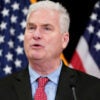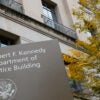Although required by law to submit a budget and Economic Report of the President to Congress no later than the first Monday in February, President Joe Biden waited until March 28 to turn in his homework, a nearly two-month extension many students would envy.
Now, in a scathing rebuttal Friday to Biden’s report on the economy, Sen. Mike Lee, R-Utah, the ranking member of the Joint Economic Committee, dissects and refutes each component of the left’s diversion from the true source of inflation.
Lee found four policy decisions specifically caused by Biden—not Russian President Vladimir Putin—that amplified today’s mounting inflationary pressure.
While Russia’s invasion of Ukraine exacerbated inflation and gas prices, inflation was already at 7.5% before the conflict. In fact, inflation was below 2% before Biden was inaugurated in January 2021.
Factoring in the federal government’s reckless inflationary actions and the current international energy shortages, the Joint Economic Committee estimated that the average American household will shoulder a burden of more than $6,800 in inflationary pressure over just the next year, assuming prices do not increase further.
The first policy decision cited was the disastrous American Rescue Plan, passed in March 2021. Over $1.9 trillion of borrowed money was thrown into an already overheated economy, fueling the conflagration of inflation we are experiencing today.
Second, the excessive monetary response to the pandemic continued to flood the economy with cheap credit well past the point of necessity. Afraid of letting the markets take the reins, the Federal Reserve pressed the gas pedal on consumer demand by keeping interest rates near 0%.
Through this unrestricted quantitative easing, the Federal Reserve has more than doubled the assets on its balance sheet from $4.2 trillion in March 2020 to $8.9 trillion last month.
Third, while Biden blames hardworking entrepreneurs—the supply side of the economy—for inflation, he fails to take account of the disastrous impact of his onerous government overregulation of the economy.
Due to their economies of scale and the efficiencies of bulk transport for goods, container ports are the backbone of international supply chains. Regrettably, America has some of the most inane rules and regulations regarding how cargo must be carried and transported, due in no small part to the International Longshore and Warehouse Union, which has long fought common industry automation.
Little wonder that we have faced acute supply chain issues or that the Port of Long Beach in California ranked dead last in the 2021 Container Port Performance Index. Stated simply, regulatory incompetence is the main driver of supply chain issues, not market mechanisms or greedy corporations.
In fact, the sheer number of federal regulations that companies are required to abide by has increased from an astounding 400,000 in 1970 to well over 1.1 million by 2021, according to data the Joint Economic Council compiled from the Mercatus Center’s QuantGov. The latter is a tool from the think tank at George Mason University that allows for quantitative data analysis of federal regulations.
Lastly, the Biden administration has made it harder for people to earn a living and more difficult to get an education that prepares them for the workforce. Using data from the Bureau of Economic Analysis, the Joint Economic Committee estimates that as many as 6.3 million workers are missing from the labor force, compared with pre-pandemic trends.
Why might this be? Researchers from the University of Chicago found that almost 70% of unemployment benefits claimants received benefits in excess of their normal wages, adjusted for taxation. Given the choice between hard work and collecting a tax-free boosted unemployment check, many Americans followed the government’s incentive right out of the labor force.
For the children enduring tanking academics due to school closures and ineffective online alternatives, McKinsey & Co. estimates that the average student lost between $61,000 and $82,000 in lifetime earnings, with even worse outcomes for black and Hispanic students.
Vital skills, both social and technical, lost due to school closures will haunt these children well into their adult careers. Therefore, not only is the purchasing power of the average American being reduced currently, but future generations also will endure both higher prices and a lowered earning potential.
Rather than rein in the reckless spending and the regulatory state that is causing inflation, the current administration wants to double down on its expansionary fiscal policy to pursue “green industrial policies.”
In a move that reeks of the corruption of the Obama-era Solyndra scandal, Biden dedicates his report’s seventh chapter to doubling down on “Accelerating and Smoothing the Clean Energy Transition,” a veiled attempt at using “climate change” to justify central planning.
Despite the unfettered warnings that so-called green energy creates unreliable power grids and chiefly burdens low-income Americans, the administration seems not only dismissive of inflation and reckless spending, but is also actively pursuing policies that will cause higher inflation in the future.
By contrast, Lee’s response to Biden’s economic report has highlighted the path to genuine future economic prosperity.
A responsible budget, prudent and measured economic guidance, and a sense of responsibility at all levels of authority will allow America to enter into its next Golden Age. America can reach a new zenith of economic power once again, but only if we take to heart these enduring economic lessons.
Have an opinion about this article? To sound off, please email [email protected] and we’ll consider publishing your edited remarks in our regular “We Hear You” feature. Remember to include the url or headline of the article plus your name and town and/or state.






























